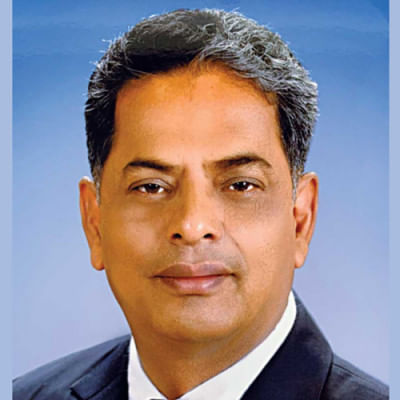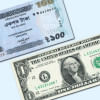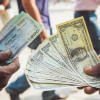Individuals buying dollar as investment

As the Russia-Ukraine war broke out, Bangladesh witnessed a huge deficit in the balance of payments which was the main cause for a recent dollar crisis in the country where speculation fuelled the dearth, says AKM Ismail Haq, president of the Money Changers' Association of Bangladesh.
Bangladesh's trade deficit shot up 53 per cent year-on-year to $27.5 billion in the July-April period of last fiscal year, exceeding last year's total shortfall, according to Bangladesh Bank data.
As a result, there was a dearth of US dollars and the exchange rate of the greenback jumped to Tk 120 in the kerb market in Bangladesh recently.
The exchange rate of the dollar in the interbank foreign exchange platform, where banks buy and sell among each other, stood at Tk 95 per US dollar, up by more than 12 per cent year-on-year.
Many depositors and share market investors came to buy dollars on a speculation that the price of dollar will soar, Haq said.
"They bought dollars like products," he said.
On the other hand, tourists who has long-term plans to travel also tried to hold onto dollars, so the demand was pushed up, Haq said during an interview with The Daily Star yesterday.
After the war, prices of fuel, food and other products surged in the world market so import costs soared, thus the demand for the dollar rose but exports have not kept pace with that.
About the big difference in the prices of dollars in the banking channel and money exchange, he said banks can buy dollars from the central bank and other banks, so their rate was controlled by the regulator.
"However, we can buy only from individuals against their passports and also sell to them, so the rate differs," he said, adding that demand and supply fixed the price of the dollar in the money exchange.
In that perspective, the association urged the central bank to raise the endorsement limit of money exchanges.
"Now, we can endorse only $1,000 for each passport, whereas a bank can endorse up to $12,000. If the regulator allows us to endorse up to at least $5,000, then our scope will be increased," he said.
Bangladesh Bank's decision to allow all branches of banks to trade dollars on condition of approvals will ease the dollar crisis, Haq said.
However, money exchangers may lose business as people will prefer going to banks, he said.
About the central bank's recent step to curb manipulation by money changers, he said malpractices of some money changers created a bad image for the whole sector.
Bangladesh Bank suspended the licences of five foreign exchange houses and served show-cause notices to an additional 42 for their alleged involvement in the manipulation of US dollar prices in the kerb market two weeks ago.
"We urged the regulator for many days to take action against illegal money changers who were continuing their activities even by opening branches," he said.
"The steps were late to come about," he said.
Some legal money changers were also punished and some were issued show-cause notices for activities that were not legal, he added.

 For all latest news, follow The Daily Star's Google News channel.
For all latest news, follow The Daily Star's Google News channel. 








Comments